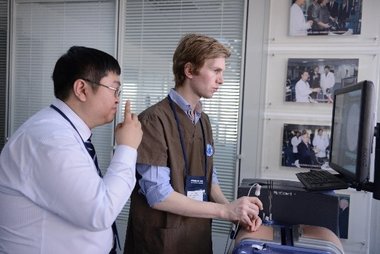17 November 2021
A new study has shown that simulation-based training offers the surgical profession a clearly improved alternative option to operating on real patients or cadavers.
The Simulation in Urological Training and Education (SIMULATE) trial is the first international multi-institutional randomised controlled trial (RCT) to investigate whether junior urology surgeons achieve surgical proficiency sooner with additional simulation training, and whether there are improved patient outcomes.
The trial was supported by King’s Health Partners Academic Surgery programme, funded by The Urology Foundation and led by King’s College London in collaboration with internationally renowned universities, researchers and a number of NHS trusts, including Guy’s and St Thomas’ and King’s College Hospital. Sixty-five junior surgeons and more than 1,000 patients took part in the trial over 18 months.
Traditional surgical training has often relied on practice in theatre, but with the rise in minimally invasive surgery the learning curve has steepened and requires more hours of complex training than ever before. Influenced by the military and aviation industries, simulation-based training has been widely adopted for use in surgery and urology as it can provide safe and controlled environments for training without endangering patient safety.
To date, there has been limited data or evaluation to prove whether simulation-based training enhances surgical ability, and some concerns exist around its transferability to real life surgery. However, the SIMULATE trail has importantly shown that simulation-based training does improve performance in the operating theatre and reduces surgical complications.
Dr Abdullatif Aydin, first author of the SIMULATE trial and National Institute for Health Research Academic Clinical Fellow in Urology, said:
As training surgeons, our aim is to become good surgeons whilst providing the best possible care to our patients. For the first time, SIMULATE demonstrates that supplementary simulation-based training of surgical trainees results in better performance and less complications, when operating on patients. It also shows twice as many trainees become proficient in complex procedures compared to only training in the operating theatre. Our study provides the evidence-base for surgical specialties to integrate simulation in their training programmes as a means to improve surgical performance, clinical outcomes and patient safety. I’m absolutely delighted that our findings have been accepted in European Urology and I would like to thank The Urology Foundation and all our contributors for helping make this possible.
Prof Prokar Dasgupta, Professor of Surgery at King’s Health Partners, Chair in Robotic Surgery and Urological Innovation at King’s College London, and senior author on the paper said:
I would like to congratulate my colleague Abdullatif who has helped lead this world first trial for our Academic Surgery programme. Initially a British study, the trial had to be scaled to Europe, Japan, China, United States of America and Canada. It was a massive international effort that was only possible due to the close collaboration with our clinical colleagues from around the world, and we are very thankful for the support they provided. Most importantly, the results of the trial will help redefine surgical training and directly improve patient outcomes going forward.
Findings from the trial have recently been accepted by European Urology, one of the world’s highest impact surgical journals. It is expected that the results of the trial will have a positive impact for advanced procedural training beyond the fields of surgery and urology.
To find out more, watch the video below of Prof Prokar Dasgupta explaining simulation-based training, the SIMULATE trial and its impact:





